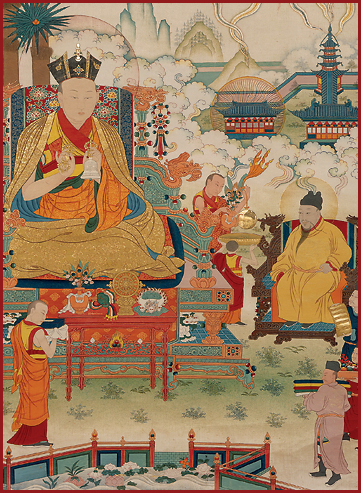Tibet has a long history of combining religious and political power. The modern separation of church and state was not valued in Tibet, for it was felt that the country would be best served if Dharma principles were applied in ruling, and if political power were used to support the Dharma. Acting on these values, many of Tibet’s first emperors sought to emulate the great Dharma kings of India. Later, in the 13th century, the Sakya school assumed rule of Tibet through an alliance with the Mongol emperors of China. The Gelug school similarly consolidated religious and political power in the 17th century, and thus governed Tibet until the Chinese invasion in the 1950s.
Tibet thus has many venerable precedents for spiritual authorities serving as political leaders. Nevertheless, for nine centuries the Karmapas have declined the numerous opportunities history offered them to wield political power. This is not to say that the Karmapas refused to work for the social good. Rather, they did so consistently as peacemakers and as a spiritual figures, rather than as political figures.
The First Karmapa (1110-1193) set the pattern that would repeat itself over and again in the Karmapa reincarnation lineage. Upon his return to his native Kham in eastern Tibet, Dusum Khyenpa, mediated between warring factions on numerous occasions with consistent success. As a highly respected spiritual leader, his words carried great weight. At times his mere presence had the effect of changing the dynamics of the situation, making peace possible.
The Fourth Karmapa, Rolpe Dorje (1340-1383), lived during a time of protracted conflict between the Sakya and Drigung Kagyu orders of Tibetan Buddhism. With courage and skill, he stepped into an active peacemaking role in this complex dispute. To that end, Rolpe Dorje exchanged initiations with Lama Dampa Sönam Gyaltsen (1312-1375), one of the supreme Sakya lamas—making a powerful statement of respect and appreciation for that sect’s teachings at a time when it had lost its hold on political power. Meanwhile, the Fourth Karmapa also directed material resources towards the restoration of the Drigung monastery, again displaying a strong gesture of respect. In this wise way, Rolpe Dorje cultivated harmonious relationships with both factions, and used his influence to work for harmony between the two of them as well.
World history offers few examples of the complete renunciation of political power displayed by the Fifth Karmapa, Deshin Shegpa. When the Fifth Karmapa was in his early 20s, he accepted an invitation from the ruler of Ming-dynasty China, Yongle Emperor, to travel to China to teach at the imperial court and perform religious services for the emperor’s deceased parents. Though his status as the emperor’s lama granted Deshin Shegpa enormous influence and power, he repeatedly declined to exercise that power to promote his own sect. When the Fifth Karmapa was presented with a proposal by Yongle Emperor to send military forces to curtail other sects’ activities in Tibet and support his Karma Kagyu lineage, Deshin Shegpa reportedly replied that a variety of teaching traditions were needed in Tibet, to suit the variety of disciples’ predispositions and needs, and that each sect made a distinct contribution. In the end, he was able to avert a planned invasion of Tibet by the Ming emperor.
Due to the Fifth Karmapa’s truly enlightened perspective and his deft response to the emperor’s ambitions, the Ming dynasty (1368-1644) was dissuaded from pursuing imperial designs on Tibet. In the 13th century, China’s Yuan dynasty had sent military forces to Tibet with the consent or encouragement of Tibetan religious figures, as would the Qing dynasty emperors centuries later. The fact that, for the intervening three centuries of Ming rule, Tibet was able to pursue its religious and secular affairs free of external interference was a lasting contribution of the Karmapa in his historical role as peacemaker.
In the social and historical context of Tibet—where spiritual authority readily translated into political authority—the Karmapas have displayed a notable disinterest in gaining political power. Yet this disinterest did not lead them to shirk their responsibility as Buddhist leaders to work for peace—both inner and outer.
|
|
|||
 The Fifth Karmapa pictured here with the Yongle Emperor, whose planned invasion of Tibet the Gyalwang Karmapa was able to avert. |
Karmapas' Contributions to Art, Culture and History PEACEMAKING |
||


